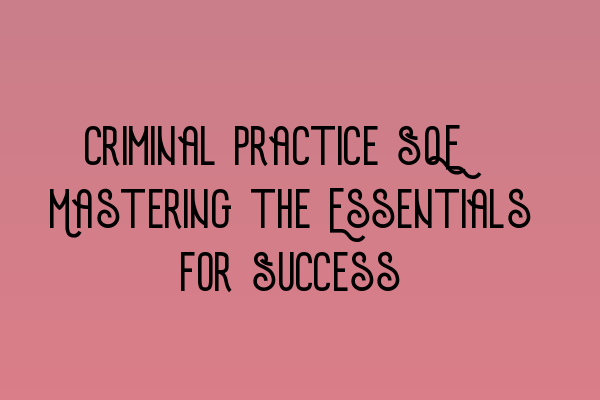Criminal Practice SQE: Mastering the Essentials for Success
Introduction
As a solicitor, building a strong foundation in criminal law and practice is essential for success in your
career. With the introduction of the Solicitors Qualifying Exam (SQE), the way legal professionals qualify
in the UK has changed. In this article, we will explore the key essentials you need to master in criminal
practice to excel in the SQE exams and thrive in your legal practice.
Understanding the SQE
The SQE is a series of exams designed to assess a candidate’s knowledge, skills, and capabilities to practice
as a solicitor in England and Wales. The criminal law and practice module is a significant component of the
SQE exams. It covers various aspects of criminal law, including criminal procedure, evidence, and
sentencing.
To succeed in the SQE, it is crucial to have a strong understanding of key criminal law principles,
procedures, and legal frameworks. This knowledge will not only help you excel in the exams but also equip
you with the necessary skills to handle criminal cases effectively in your legal career.
Mastering Criminal Practice
Mastering criminal practice is a multi-faceted endeavor that requires a combination of theoretical knowledge,
practical skills, and analytical thinking. Here are some key areas to focus on:
1. Criminal Procedure
Understanding the criminal procedure is essential for any criminal lawyer. Familiarize yourself with the
various stages of criminal proceedings, from arrest and charge to trial and sentencing. A strong grasp of
criminal procedure will help you navigate the intricacies of representing clients effectively.
2. Evidence and Case Analysis
Analyzing evidence and building a compelling case strategy is a crucial skill for criminal lawyers. Learn how
to evaluate and interpret various forms of evidence, such as witness statements, forensic reports, and
digital evidence. Develop the ability to identify key facts, assess credibility, and construct persuasive
arguments based on the evidence.
3. Sentencing Principles
Understanding sentencing principles and guidelines is essential for criminal lawyers. Gain a thorough
knowledge of the factors that courts consider when determining appropriate sentences for different offenses.
Familiarize yourself with sentencing guidelines and case law to effectively advocate for your clients during
sentencing hearings.
Preparing for the SQE Exams
Success in the SQE exams requires thorough preparation and practice. Here are some resources to help you
prepare:
- SQE 1 Preparation Courses – These courses offer comprehensive coverage of the criminal law and practice module, ensuring you have a solid understanding of the key concepts and principles.
- SQE 2 Preparation Courses – These courses provide practical training and skill development opportunities, allowing you to practice applying your knowledge to real-world scenarios.
- SQE 1 Practice Exam Questions – Use these practice exam questions to test your knowledge and familiarize yourself with the structure and format of the SQE exams.
- SQE 1 Practice Mocks FLK1 FLK2 – These practice mocks offer a simulated exam experience, allowing you to assess your readiness and identify areas for improvement.
- SRA SQE Exam Dates – Stay updated with the latest SQE exam dates and deadlines to plan your preparation effectively.
Conclusion
Mastery of criminal practice is crucial for success in the SQE exams and your legal career. By developing a
strong foundation in criminal law principles, criminal procedure, evidence analysis, and sentencing
principles, you will enhance your chances of excelling in the SQE exams and becoming a skilled criminal
lawyer. Utilize the resources mentioned above to prepare effectively and stay committed to continuous
learning and improvement. Good luck on your SQE journey!
